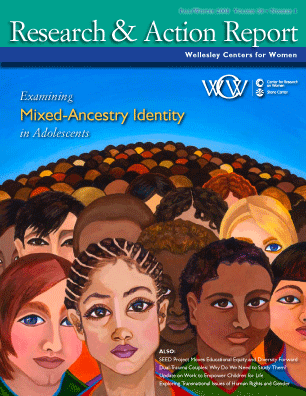Sally Engle Merry, a senior scholar at the Wellesley Centers for Women (WCW), is a professor of anthropology and the director of the Law and Society Program at New York University. Previously, at Wellesley College, she was Marion Butler McLean Professor in the History of Ideas and professor of anthropology. Her primary areas of research include the rule of law in various contexts of community life and the adaptation of international standards of human rights to life in local communities.
Two years ago, scholars at the Wellesley Centers for Women (WCW) launched a study of racial and ethnic identification among adolescents of mixed ancestry. The reasons for pursuing the research were several. Most literature about ethnic/racial self-identification patterns derived from adult respondents. For example, the series of studies that led to the change in wording of racial self-identification in the 2000 Census was carried out with adults.
The Robert S. and Grace W. Stone Primary Prevention Initiatives Grant Program, Empowering Children for Life, was established at the Wellesley Centers for Women (WCW) in 2003. This program provided support for research and evaluation that advance understanding the role of relationships in fostering child and adolescent welbeing and healthy human development. Researchers from across the country were invited to submit proposals for funding to support dissertation research or larger research projects.
The notion of the intergenerational transmission of abuse has been accepted for some time. Both research and our own observations lead us to expect that having been abused or neglected or having witnessed violence between parents as a child will contribute to an individual’s increased risk to abuse or neglect one’s own child or to be involved in an abusive relationship as an adult.
Twenty-two years ago, Peggy McIntosh founded a teacher professional development project to work for gender equity in schools. She thought of it as an experiment in faculty-led faculty development – empowering teachers to work within their own schools, and within themselves, for change.

In this issue:
 | Wellesley Centers for Women 781.283.2500 |
Copyright © 2025 Wellesley Centers for Women, Wellesley College | Privacy Policy
National SEED Project | National Institute on Out-of-School Time
